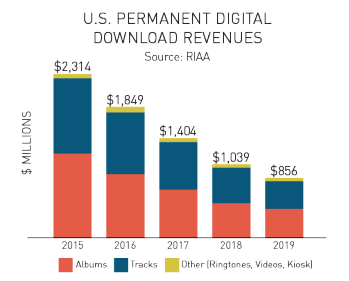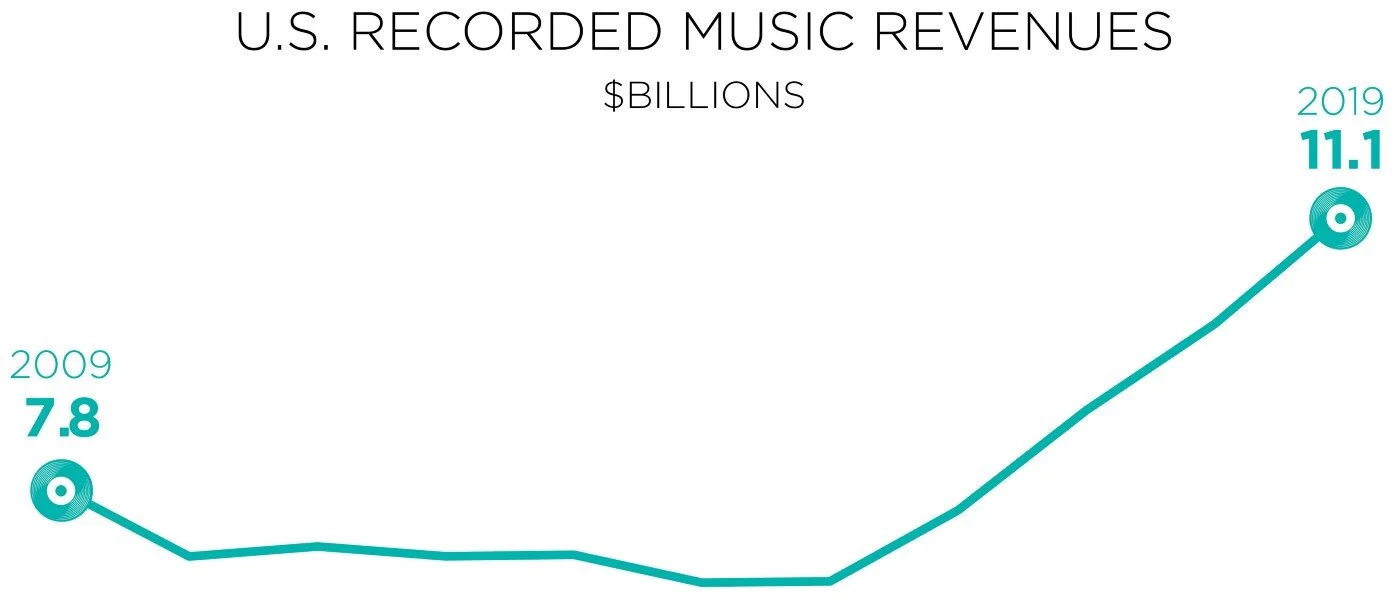Don't Believe Hype About The Music Industry...
By: Ivan Munoz
You may have read in recent FORBES or Wallstreet Journal pieces that tout and exalt digital music’s incredible growth over the last 10 years due in large part to the industry’s embrace of a streaming music business model for recorded works. You may also be wondering why you’re still broke and struggling in the music industry…here is why:
Music Industry Revenues - 10 Year Comparison
What a fascinating difference a short ten years can make. Over the past decade, the entire landscape of the music industry has shifted drastically; as is evident by these charts. Spotify is the largest music streaming service, followed second by Apple Music, with the others such as Amazon and YouTube trailing behind. As you can see in only ten years, these streaming companies, mostly Spotify and Apple Music, have dominated the market, growing by exorbitant amounts, and are now responsible for 79% of the music industry revenue.
So what happens when the cost of a song is essentially reduced to nothing? The artists suffer, that’s for sure, but now the music industry is transforming into somewhat of a hybridized tech industry in which the music is no longer the primary product, rather somewhat of a software/accessory, and a means of selling the hardware (smartphones, iPods, iPads, etc.). Since music is no longer dominantly a physical, or even purchasable medium (at least not by 2009’s definition), the music companies have to make up for that somehow, so they push other things that are tangentially related to music. And who takes the brunt of the losses for this? Not the music companies, but the artists.
We also cannot forget about data. We, the listeners, have become the product! As we scroll, stream, and listen away, our phones and all these apps are quietly collecting tons of data on us, which these streaming services ultimately compile and then sell to the giant music companies and advertisement agencies, priming us all to be the “perfect consumer”.
2. Paid Music Subscriptions
This data shown here corroborates information of the first graph, while also showing the specific numbers of the burgeoning streaming business. This, beyond a shadow of a doubt, demonstrates that streaming is THE new medium for music. In fact, from 2015 to 2019 the number of paid music subscriptions saw a substantial increase of 559%. As we move further away from a physical medium and become more immersed the ‘the cloud’ and the intangible pseudo-ownership of music, these numbers are only bound to increase.
3. Permanent Digital Downloads
Now compare the above statistic with this one - see the opposing trend? The more “on demand” music we stream, the further and further we stray from the purchasing or owning of the music. You think this might be a new thing, but this is a similar trend repeated itself in many forms:
The same thing happened when radio overshadowed record sales in the 1930’s, or when digital downloads in the 2000’s slowed the sale of music’s physical medium, the CD, at the time. Now streaming has taken over as the dominant form of music listening, while downloads fall by the wayside. And as such, the natural cycle continues.
4. Annual Record Sales
In a world in which the mainstream music industry is seemingly shrouded in a dark cloud almost anywhere you turn, a silver lining arises. The ‘golden-era’ medium, the disk record, has been steadily making a return over the past ten years. As streaming becomes more and more prevalent, music lovers yearn for the days of yore when they could take pride in having a physical copy, of the highest quality, of their favorite music in their possession. And thus the disk record enters its second act, still reigning supreme, proving that sometimes we do get it right the first time.
This is wonderful news to musicians and music lovers and alike, what with the advent of third party presseries and boutique record labels (such as Jack White’s Third Man records, for example) that are more focused on the artist, it gives some power back to the artist. They can take control of the sale and distribution of their music, reach their fans directly - and be supported by them more readily, and begin to take back their foothold in an industry that has, by and large, marginalized them and left them behind.
5. Recorded Music Revenue Growth
Though on the surface this statistic gives the appearance of success and prosperity, it is actually incredibly troubling. Here’s why: these numbers simply don’t represent the artist. They only represent the giant monolithic tech companies at the top of the ladder who have taken over the music industry. Be warned, you are being sold a lie when you see these “too good to be true” numbers that supposedly represent a booming music industry. It is the “big three” record companies and worldwide monopolistic conglomerates that usurp the agency of the artist and co-opt the messages of the music in order to twist it into making a quick buck. When a company’s sole mission is to satisfy the stock-holders, as oppose to the employees and creators who make everything possible, then is has wantonly engaged in a blatant ethical failing.
Those who care only about the bottom line and care nothing for the sanctity of the music, are the ones we need to watch out for. They will always leave the artist as the last priority as they systematically and continuously gut, sell out, and dismantle the arts from the inside out; taking power from the people in the process. This is a slow but deliberate erosion of our musical integrity and it must be stopped at all costs. For more information on this particular topic, check out this article (linked below), which provides an in-detail analysis of the current state of the music industry.
If you like this content, support Victor by visiting VictorRecords.com and signing up to our mailing list today! Join our historic movement for the future in taking back the music industry.
About The Author
Ivan Munoz is a musician, bassist, singer, musicians advocate, and member of the Victor Talking Machine Company. Along with this Ivan can be found devoting his time to various musical projects, compositions, and working on musical instruments. Click the photo for more!







